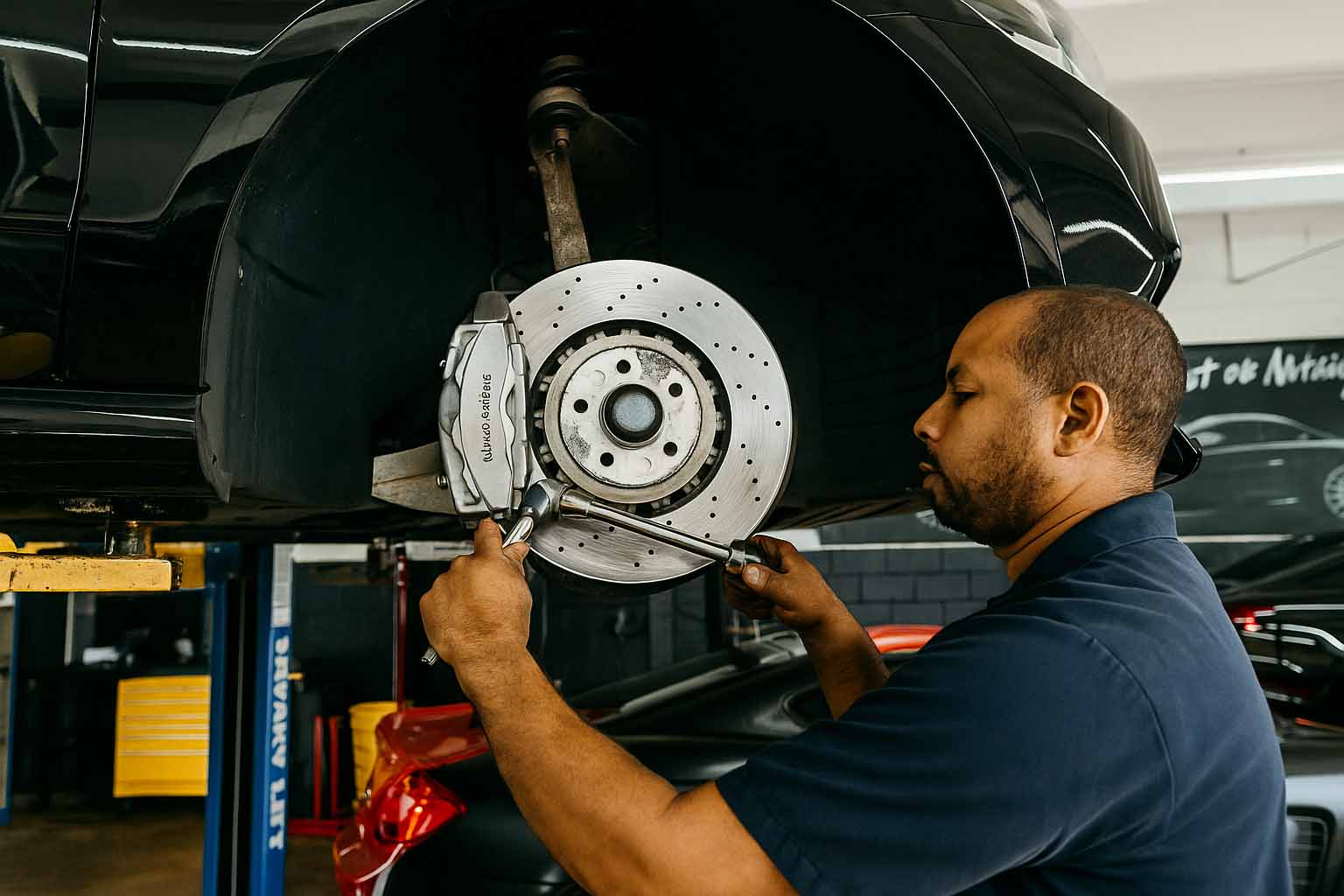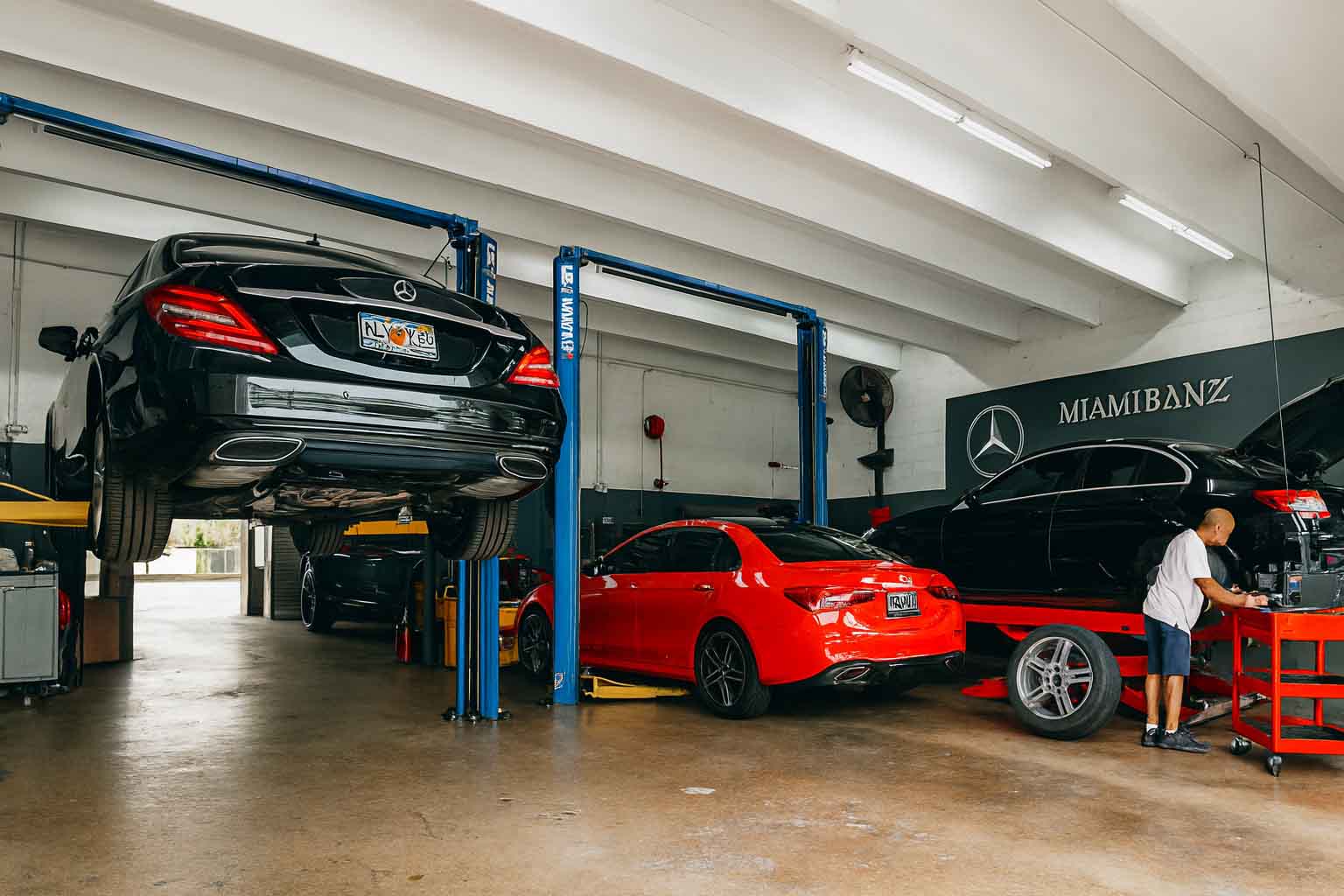Owning a Mercedes-Benz in Miami means enjoying performance, luxury, and style on every drive. But Miami’s climate — with its humid summers, sudden rainstorms, and constant stop-and-go traffic — takes a toll on your vehicle, especially the braking system.
If you’ve ever wondered why your Mercedes brakes wear faster here than in cooler, drier cities, you’re not alone. This article explores how Miami’s weather and driving conditions impact your brakes, what you can do to extend their lifespan, and when to book service with a Mercedes specialist.
Why Miami’s Climate is Tough on Mercedes Brakes
Mercedes-Benz braking systems are precision engineered, but Miami presents unique challenges:
1. Heat and Humidity
High humidity and frequent downpours expose brake components to constant moisture. This can lead to surface rust on rotors, accelerated wear of brake pads, and even reduced brake fluid performance over time.
2. Coastal Salt Air
Living near the ocean means salt-laden air, which is corrosive to metal components. Brake rotors, calipers, and hardware are especially vulnerable, leading to squeaks, grinding, and premature replacement.
3. Stop-and-Go Traffic
From Downtown Miami to Coral Gables, stop-and-go driving is the norm. Constant braking increases pad wear and builds heat in the rotors, shortening their lifespan.
4. Sudden Heavy Rains
Frequent rain showers cause wet rotors, which can temporarily reduce stopping power. Over time, moisture combined with heat cycles creates uneven rotor deposits, leading to vibration and pulsation.
Common Signs of Accelerated Brake Wear in Miami
If you drive a Mercedes in South Florida, you may notice these issues sooner than expected:
- Squealing or grinding noises after humid nights or rainy days.
- Rust build-up on rotors that doesn’t clear after a few stops.
- Vibration or pulsing during braking.
- Brake pads wearing out faster than 20,000–30,000 miles.
- Soft or spongy brake pedal, often linked to moisture-contaminated fluid.
If any of these sound familiar, it’s time to schedule an inspection. Visit our Mercedes servicing and maintenance page to learn how we keep Miami drivers safe year-round.
How to Extend the Life of Your Brakes in Miami
While Miami’s climate is tough on vehicles, you can take practical steps to protect your Mercedes’ braking system and reduce the frequency of costly repairs. Small changes in driving habits and routine care go a long way toward saving money and keeping your car safe.
1. Brake Firmly, Not Constantly
Repeated light braking generates excess heat, glazing the pads and creating uneven deposits on the rotors. Instead, apply firm, controlled pressure when you need to slow down, then release. This allows the pads and rotors to cool evenly, reducing vibration and extending their life.
2. Leave Space in Traffic
Miami traffic encourages tailgating, but leaving extra distance between you and the vehicle ahead reduces the need for sudden braking. Fewer emergency stops mean less stress on pads and rotors, and you’ll also improve fuel efficiency. Think of it as protecting both your brakes and your wallet.
3. Flush Brake Fluid Every Two Years
Brake fluid is hygroscopic, meaning it absorbs moisture. In Miami’s humid climate, that happens faster than in most places. Moisture-contaminated fluid lowers braking efficiency and corrodes internal components. A routine brake fluid exchange every two years restores pedal firmness and protects against internal rust.
4. Park Smart to Protect Against Salt Air
Salt in Miami’s coastal air accelerates corrosion. Whenever possible, park in a garage or shaded structure rather than leaving your Mercedes exposed overnight. This simple habit helps prevent rust build-up on rotors, calipers, and hardware — issues that often cause squeaks and early replacement.
5. Schedule Brake Inspections Twice a Year
Catching problems early is the easiest way to avoid expensive repairs. At Miami Benz, a brake inspection includes pad thickness measurement, rotor condition checks, fluid analysis, and electronic system scans. By scheduling an inspection every six months, you’ll spot minor issues before they compromise safety.
6. Adjust for Weather and Road Conditions
Heavy rain, sudden flooding, and Miami’s frequent stoplights all create unique braking challenges. Drive cautiously in wet conditions and give your brakes a chance to dry after driving through deep puddles. These small adjustments prevent water-soaked pads from glazing and ensure consistent stopping power.
7. Don’t Overload Your Vehicle
Carrying extra weight — whether passengers, luggage, or heavy equipment — forces your braking system to work harder. Sprinter van and SUV owners should pay particular attention, as loaded vehicles significantly increase braking distances. Keeping weight under control will extend the life of pads and rotors.
By following these steps, Miami drivers can dramatically reduce brake wear and avoid unexpected repair bills. Combine these habits with regular scheduled maintenance and your Mercedes will continue delivering the confident stopping performance it was designed for.
For peace of mind, consider booking a preventative brake inspection through our online booking system.

Why Choosing a Mercedes Specialist Matters
When it comes to brake repair, not all service is created equal. While a general mechanic might be able to change brake pads, Mercedes-Benz braking systems are far more sophisticated than those found on standard vehicles. They’re engineered with advanced electronics, complex hydraulic systems, and model-specific components that require precise expertise.
Advanced Engineering Requires Advanced Knowledge
Mercedes vehicles use features such as Adaptive Brake Assist, Electronic Stability Program (ESP), and electronic parking brakes. These systems rely on proper calibration to function correctly. If a mechanic without Mercedes-specific training installs pads or rotors incorrectly, it can throw off these safety systems and compromise your car’s performance.
The Difference OEM Parts Make
Generic brake pads and rotors may fit physically, but they often fail to deliver the same stopping power, noise reduction, or longevity as original equipment. A Mercedes specialist uses OEM-quality parts that are engineered for your exact model, ensuring optimal performance and keeping your vehicle aligned with manufacturer standards.
AMG and Performance Models Need Specialist Care
If you drive an AMG or sport package model, the braking system is even more advanced, with larger rotors, performance calipers, and high-temperature pad compounds. These require careful installation and proper bedding-in procedures. At Miami Benz, our technicians have the knowledge and experience to service performance brakes without sacrificing quality or safety.
Diagnostic Tools Make All the Difference
Mercedes-Benz braking systems are integrated with electronic sensors and wear indicators. A specialist uses factory-level diagnostic tools to scan ABS, ESP, and parking brake modules, ensuring no hidden issues go undetected. General shops rarely have this technology, which means they may miss early warning signs that could save you money later.
Transparency and Trust in Every Visit
Brake service doesn’t have to feel like a mystery. At Miami Benz, we provide clear, written estimates before any work begins. We explain whether you need pads only, pads and rotors, or a full brake service. Our goal is to give you confidence that you’re making the right decision for your car and your budget.
By choosing a Mercedes specialist in Miami, you’re not just getting a brake repair — you’re protecting your safety, your investment, and the performance that makes owning a Mercedes special. To learn more about our comprehensive approach to brake and maintenance services, visit our Mercedes service page.
And if you’ve already noticed squeaking, vibration, or warning lights, don’t wait. Book your brake service online today and experience the Miami Benz difference.
Mercedes Specialist vs. General Mechanic: What’s the Difference?
| Feature / Service | Mercedes Specialist (Miami Benz) | General Mechanic |
|---|---|---|
| Training & Expertise | Factory-trained, Mercedes-specific knowledge | General automotive knowledge, may lack Mercedes experience |
| Parts Used | OEM or OEM-equivalent Mercedes pads, rotors, and sensors | Generic aftermarket parts, may not match Mercedes specifications |
| Diagnostic Tools | Factory-level scan tools for ABS, ESP, and electronic parking brake systems | Standard diagnostic tools, may miss Mercedes-specific error codes |
| Performance & AMG Models | Expertise with high-performance AMG brake systems, correct bedding procedures | Limited knowledge, risk of incorrect installation or reduced performance |
| Calibration & Torque Specs | Follows exact Mercedes torque specifications and calibration requirements | Uses general torque values, no guarantee of calibration |
| Service Transparency | Clear, written estimates with VIN-specific details | May provide generic quotes without Mercedes-specific detail |
| Long-Term Value | Protects safety, performance, and vehicle value | Higher risk of premature wear, incorrect parts, and costly repeat repairs |
The Bottom Line
If you own a Mercedes-Benz, choosing a general mechanic might save a little upfront, but it often costs more in the long run — in both money and performance. A Mercedes specialist ensures your braking system works exactly as designed, giving you safer stops and preserving the luxury driving experience you expect.
Take the guesswork out of brake repair. Book your brake service online with Miami Benz today and drive with confidence.
When to Book Brake Service in Miami
Notice squeaks, grinding, vibration, or warning lights? Don’t wait — the longer you drive, the more damage can occur. Get a professional inspection and keep your Mercedes stopping with confidence.
- Detailed inspection of pads, rotors, sensors, and brake fluid.
- Mercedes-approved diagnostics for ABS/ESP and electronic parking brake.
- OEM or equivalent parts installed to factory specifications.
- Road testing to guarantee smooth, confident braking.
Ready for reliable stopping power?
Choose a time that fits your schedule — most brake services are completed the same day.
External Resources on Brake Safety
If you’d like to dig deeper into brake safety and maintenance, here are some trusted resources:
These resources confirm what we see daily in our workshop: brakes are one of the most critical systems to maintain, especially in demanding climates like Miami.
Ready to Protect Your Mercedes Brakes?
Miami’s climate may be tough on brakes, but with the right care, your Mercedes can maintain its performance and safety for years to come.
If you’ve noticed any of the signs we covered — squealing, vibrations, or faster-than-normal pad wear — don’t wait. Book a brake inspection today with Miami Benz and drive with confidence knowing your Mercedes is in expert hands.
Schedule Your Brake Service Now
Mercedes Brake Repair FAQs
Answers to the most common questions Miami drivers ask about Mercedes-Benz brake service, performance, and maintenance.

